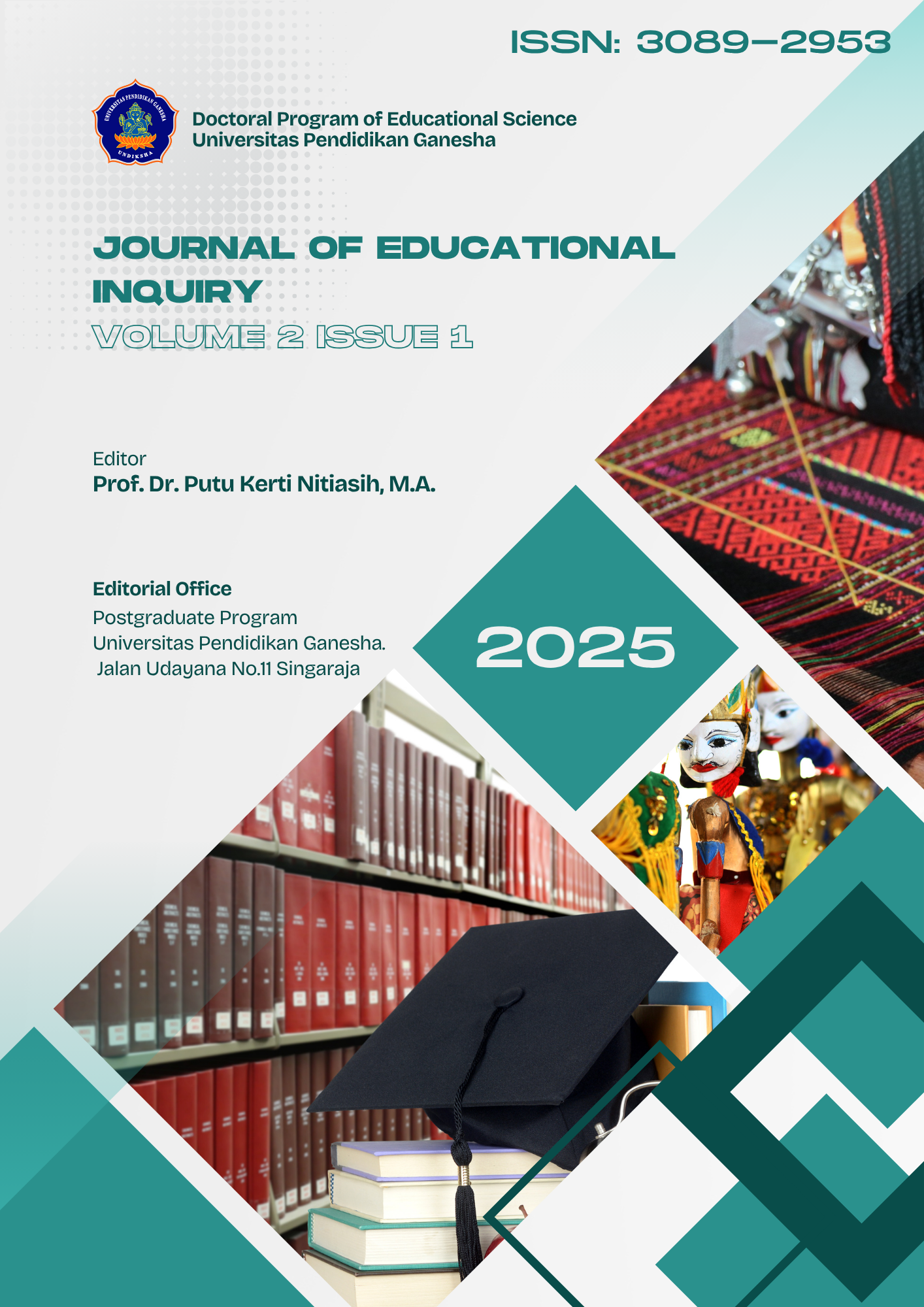Integrating Local Wisdom Values into Educational Management: A Literature Review on Character Development Aspects
Abstract
This study systematically examines the integration of local wisdom into educational management with a focus on character education. Employing a Systematic Literature Review (SLR) approach guided by the PRISMA method, relevant articles were identified through Google Scholar using the keyword "Inclusive Education," targeting publications from 2022 to 2025. The review prioritized articles from nationally accredited journals (minimum Sinta 3) and reputable international journals. After a rigorous screening process, twenty articles were selected for detailed analysis. The findings reveal that local wisdom values play a pivotal role in shaping student character, particularly in responding to globalization challenges and preserving national cultural identity. Key values such as honesty, mutual cooperation (gotong royong), responsibility, empathy, tolerance, and discipline are effectively fostered through the incorporation of local culture into curricula and school activities. Effective approaches include the development of locally grounded curricula, contextualized learning practices, and community-involved student management. Moreover, sustained collaboration among schools, communities, and government entities is crucial to reinforcing character education rooted in local wisdom.
References
Amatullah, S. F., & Komariah, A. (2021). Ethnopedagogical Leadership Based on Lampung ’ s Local Wisdom in Schools. 526(Icream 2020), 244–246.
Andini, D. R., & Sirozi, M. (2024). Integrasi kearifan lokal dalam perencanaan pengembangan kurikulum pendidikan Islam. Jurnal Inovasi, Evaluasi, dan Pengembangan Pembelajaran (JIEPP), 4(3), 465–471. https://journal.ainarapress.org/index.php/jiepp/article/view/566
Anggita, S., Endraswara, S., & Rohman, A. (2024). Heliyon Revitalizing local wisdom within character education through ethnopedagogy apporach : A case study on a preschool in Yogyakarta. Heliyon, 10(10), e31370. https://doi.org/10.1016/j.heliyon.2024.e31370
Ansar, A., Marzuki, K., & Restani, A. (2024). Implementation of Principal Leadership Based on Bugis Local Wisdom Values at SMA Negeri 1 Wajo (Issue 2016). Atlantis Press SARL. https://doi.org/10.2991/978-2-38476-210-1
Astuti, W., Rahman, B., Hariri, H., Aryani, F., Lampung, U., Soemantri, J., No, B., Lampung, B., Sains, U., & Jawa, A. (2025). Fostering Exemplary Leadership : The Role of Local Wisdom in Cultivating Positive School Climate. 13, 157–169. https://doi.org/10.37394/232018.2025.13.16
Awaluddin, A. F., Arvina, R., & Riskianti, W. (2025). Collaborative Strategies for Developing an Arabic Language Curriculum Incorporating Bugis Local Wisdom. 5, 501–515.
Dwi, S., Putri, A., & Sumarsono, R. B. (2024). Manajemen Pendidikan Karakter Berbasis Kearifan Budaya Lokal Masyarakat Samin dalam Menghadapi Era Globalisasi. 7, 77–88.
Endayani, H. (2023). Model pendidikan berbasis kearifan lokal. PEMA: Jurnal Pendidikan dan Pengabdian kepada Masyarakat, 3(1), 25–32. https://doi.org/10.56832/pema.v3i1.321
Faiz, A., & Soleh, B. (2021). Implementasi pendidikan karakter berbasis kearifan lokal. JINoP (Jurnal Inovasi Pembelajaran), 7(1), 68–77. https://doi.org/10.22219/jinop.v7i1.14250
Fajarini, U. (2014). Peranan kearifan lokal dalam pendidikan karakter. SOSIO-FITK: Jurnal Sosial dan Pendidikan Islam, 1(2), 123–130. https://journal.uinjkt.ac.id/index.php/SOSIO-FITK/article/view/1225UIN Jakarta Journal+1UIN Jakarta Journal+1
Habibudin. (2020). NILAI-NILAI KEARIFAN LOKAL SASAK DALAM PERSEKOLAHAN DI LOMBOK TIMUR. JIPSINDO, 7(1), 44–65.
Hasan, M., Arwandi, T., Nursita, L., Ibrah, S., & Kamal, M. (2022). The Quality of Education Based on Local Wisdom : The Principal of Madrasah Review. 06(02), 617–628.
Haq, E. A., Wasliman, I., Sauri, R. S., Fatkhullah, F., & Khori, A. (2022). Management of Character Education Based on Local Wisdom. Nidhomul Haq : Jurnal Manajemen Pendidikan Islam, 7(1 SE-Articles). https://doi.org/10.31538/ndh.v7i1.1998
Herjayanti, R. (2024). The Problems in Implementing the Independent Learning Curriculum at the Motivator School of Sambaliung Elementary School. 11(2), 207–214.
Hidayah, Y., Feriandi, Y. A., & Saputro, E. A. V. (2019). Transformasi kearifan lokal Jawa dalam pendidikan karakter sekolah dasar. Auladuna: Jurnal Pendidikan Dasar Islam, 6(1), 50–61. https://journal.uin-alauddin.ac.id/index.php/auladuna/article/view/50-61Journal UIN Alauddin Makassar
Imron, A., Nisa, K., Lestari, A. D., Haris, M., & Malang, N. (2023). Exploration of Integrating Local Wisdom Values in Education : Focus on Feasible Learner Management Activities and the Stakeholders (Issue Icemt). Atlantis Press SARL. https://doi.org/10.2991/978-2-38476-156-2
Istiawati, N. F. (2016). Pendidikan karakter berbasis nilai-nilai kearifan lokal adat Ammatoa dalam menumbuhkan karakter konservasi. Cendekia: Jurnal Pendidikan dan Pembelajaran, 10(1), 1–18. https://doi.org/10.30957/cendekia.v10i1.78cendekia.soloclcs.org
Joyce, K., Smith-Doerr, L., Alegria, S., Bell, S., Cruz, T., Hoffman, S. G., Noble, S. U., & Shestakofsky, B. (2021). Toward a Sociology of Artificial Intelligence: A Call for Research on Inequalities and Structural Change. Socius, 7. https://doi.org/10.1177/2378023121999581
Kusuma, R. S. (2018). Peran sentral kearifan lokal dalam peningkatan kualitas pendidikan. Jurnal Pedagogik, 5(2), 150–160.
Lande, Y. (2021). Manajemen Kurikulum dalam Konteks Pelestarian Kearifan. 417–428.
Manda, D. A. (2023). Strengthening Public School Culture : Integration of Local Wisdom , Religious Values , and Universal Values. 07(04), 1371–1382.
Priyatna, M. (2016). Pendidikan karakter berbasis kearifan lokal. Edukasi Islami: Jurnal Pendidikan Islam, 5(10), 1311–1336. https://jurnal.staialhidayahbogor.ac.id/index.php/ei/article/view/364Markas Jurnal STAI Al Hidayah Bogor
Rachmadyanti, P. (2017). Penguatan pendidikan karakter bagi siswa sekolah dasar melalui kearifan lokal. Jurnal Pendidikan Sekolah Dasar (JPSD), 3(2), 201–214. https://doi.org/10.30870/jpsd.v3i2.2140EJurnal UNG
Raharja, A. D., Selvia, M., & Hilman, C. (2022). Revitalisasi nilai-nilai kearifan lokal dalam pendidikan yang relevan dalam mengatasi permasalahan global. Jurnal Inovasi, Evaluasi dan Pengembangan Pembelajaran (JIEPP), 2(2), 85–89. https://journal.ainarapress.org/index.php/jiepp/article/view/215
Rakhman, F., & Fauzan, M. (2025). Conflict Management in Islamic Boarding Schools : A Framework Based on Local Wisdom for Educational Institutions. 09(01), 124–137.
Rosala, D. (2016). Pembelajaran seni budaya berbasis kearifan lokal dalam upaya membangun pendidikan karakter siswa di sekolah dasar. Ritme: Jurnal Seni dan Desain serta Pembelajarannya, 2(1), 16–25. https://ejournal.upi.edu/index.php/ritme/article/view/5078E-Journal UPI+1E-Journal UPI+1
Saidek, A. R. (2023). Optimizing The Prototype Curriculum Based on Religious Values and Local Wisdom through The Principal ’ s Role. 07(02), 651–664.
Sakti, S. A., Endraswara, S., & Rohman, A. (2024). Revitalizing local wisdom within character education through ethnopedagogy apporach: A case study on a preschool in Yogyakarta. Heliyon, 10(10), e31370. https://doi.org/https://doi.org/10.1016/j.heliyon.2024.e31370
Sanjaya, Y. A., Safitri, D., & Sujarwo. (2024). Integrasi nilai-nilai kearifan lokal dalam pengembangan pendidikan karakter di era 4.0. JICN: Journal of Islamic Civilization and Nusantara, 1(2), 45–58. https://jicnusantara.com/index.php/jicn/article/view/331
Suwito Eko, P., Eko, H., Munandar, M. A., & Rachman, M. (2020). Local Wisdom: Pillar Development of Multicultural Nations and National Education Values. Cypriot Journal of Educational Sciences, 15(6), 1587–1598. https://doi.org/https://doi.org/10.29333/iji.2020.13213a
Suwito, P., Semarang, U. N., Campus, C. S., & City, S. (2020). Cypriot Journal of Educational Local wisdom : Pillar development of multicultural nations and national education values. 15(6), 1587–1598.
Suyitno, I. (2012). Pengembangan pendidikan karakter dan budaya bangsa berwawasan kearifan lokal. Jurnal Pendidikan Karakter, 2(1), 1–13. https://journal.uny.ac.id/index.php/jpka/article/view/1307UNY Journal
Tohri, A., Rasyad, A., Sururuddin, M., Istiqlal, L. M., & Info, A. (2022). The urgency of Sasak local wisdom-based character education for elementary school in East Lombok , Indonesia. 11(1). https://doi.org/10.11591/ijere.v11i1.21869
Wayan, S. I., Pawito, P., Sri, H., & Argyo, D. (2025). Adat tapsila representation of the transformation of communication , information , and education of local wisdom wetu telu in efforts for environmental conservation in North Lombok ,. 03018, 1–9.
Wulandari, I., Handoyo, E., Yulianto, A., Sumartiningsih, S., & Fuchs, P. X. (2024). Integrasi nilai kearifan lokal dalam pendidikan karakter siswa di era globalisasi. Pendekar: Jurnal Pendidikan Berkarakter, 7(4), 370–376. https://journal.ummat.ac.id/index.php/pendekar/article/view/27026
Yuniar, D. P., Luqman, F., Ariyanto, T., Fitria, A., & Da, U. (2023). Management of School Learning Based on Madura Local Wisdom Applications in the Freedom to Learn Era (Issue Siccep). Atlantis Press SARL. https://doi.org/10.2991/978-2-38476-184-5
Copyright (c) 2025 Ni Putu Dwi Sucita Dartini, Andika Syahputra, Laxmi Zahara, Agus Wijaksono, Mikaus Gombo

This work is licensed under a Creative Commons Attribution-ShareAlike 4.0 International License.
Author who publishes in the IJEI agrees to the following terms:
- Author retains the copyright and grants the journal the right of first publication of the work simultaneously licensed under the Creative Commons Attribution-ShareAlike 4.0 License that allows others to share the work with an acknowledgement of the work's authorship and initial publication in this journal
- Author is able to enter into separate, additional contractual arrangements for the non-exclusive distribution of the journal's published version of the work (e.g., post it to an institutional repository or publish it in a book) with the acknowledgement of its initial publication in this journal.
- Author is permitted and encouraged to post his/her work online (e.g., in institutional repositories or on their website) prior to and during the submission process, as it can lead to productive exchanges, as well as earlier and greater citation of the published work (See The Effect of Open Access).










